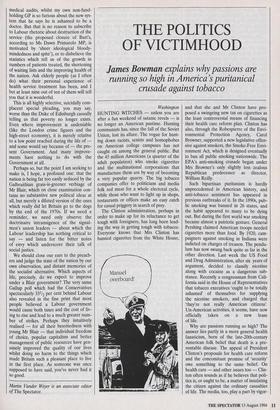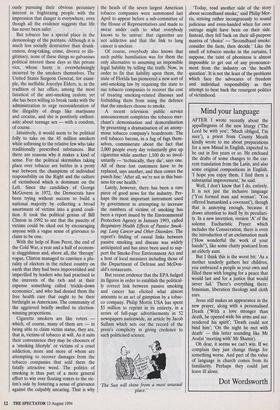THE POLITICS OF VICTIMHOOD
James Bowman explains why passions are
running so high in America's puritanical crusade against tobacco
Washington HUNTING WITCHES — unless you are after a fun weekend of satanic revels — is no longer an American pastime. Hunting communists has, since the fall of the Soviet Union, lost its allure. The vogue for hunt- ing down racists, sexists and homophobes on American college campuses has not caught on among the general public. But the 45 million Americans (a quarter of the adult population) who smoke cigarettes and the multinational corporations that manufacture them are by way of becoming a very popular quarry. The big tobacco companies offer to politicians and media folk red meat for a whole electoral cycle, while those who want to light up in shops, restaurants or offices make an easy catch for casual priggery in search of prey.
The Clinton administration, perhaps in order to make up for its reluctance to get tough with foreigners, has long been lead- ing the way in getting tough with tobacco. Everyone knows that Mrs Clinton has banned cigarettes from the White House, and that she and Mr Clinton have pro- posed a swingeing new tax on cigarettes as the least controversial means of financing their health care reform plan. Clinton has also, through the Robespierre of the Envi- ronmental Protection Agency, Carol Browner, supported a new legislative offen- sive against smokers, the Smoke-Free Envi- ronment Act, which is designed eventually to ban all public smoking nationwide. The EPA's anti-smoking crusade began under Mrs Browner's only slightly less zealous Republican predecessor as director, William Reilly.
Such bipartisan puritanism is hardly unprecedented in American history, and anti-tobacco sentiment has appeared in previous outbreaks of it. In the 1890s, pub- lic smoking was banned in 26 states, and the habit appeared to many to be dying out. But during the first world war smoking became almost a patriotic gesture. General Pershing claimed American troops needed cigarettes more than food. By 1920, cam- paigners against smoking in Indiana were indicted on charges of treason. The pendu- lum has now swung back quite as far in the other direction. Last week the US Food and Drug Administration, after six years of argument, decided to classify nicotine along with cocaine as a dangerous sub- stance. Recently a congressman from Cali- fornia said in the House of Representatives that tobacco executives 'ought to be totally ashamed' of themselves for supplying the nicotine smokers, and charged that `they're not really American citizens'. Un-American activities, it seems, have now officially taken on a new lease of life.
Why are passions running so high? The answer lies partly in a more general health fanaticism, born of the late-20th-century American folk belief that death is a pre- ventable disease. The appeal of President Clinton's proposals for health care reform and the concomitant promise of 'security' owe something to the same belief. On health care — and other issues too — Clin- ton often sounds as if he believes that poli- tics is, or ought to be, a matter of insulating the citizen against the ordinary casualties of life. The media, too, play a part by vigor- ously pursuing their obvious pecuniary interest in frightening people with the impression that danger is everywhere, even though all the evidence suggests that life has never been safer.
But tobacco has a special place in the demonology of the puritans. Although it is much less socially destructive than drunk- enness, drug-taking, crime, divorce or ille- gitimacy, none of these things so galvanises political interest these days as this private vice, whose harm is overwhelmingly incurred by the smokers themselves. The United States Surgeon General, for exam- ple, the ineffable Joycelyn Elders, is, in the tradition of her office, among the most fanatical of the anti-smoking zealots; yet she has been willing to break ranks with the administration to urge reconsideration of the illegality of drugs like marijuana and cocaine, and she is positively enthusi- astic about teenage sex — with a condom, of course.
Intuitively, it would seem to be political folly to take on the 45 million smokers while softening to the relative few who take traditionally prescribed substances. But there are reasons why it makes a kind of sense. For the political skirmishes taking place over tobacco are battles in a proxy war between the champions of individual responsibility on the Right and the culture of victimhood which is dominant on the Left. Since the candidacy of George McGovern in 1972, the Democrats have been trying without success to build a national majority by collecting a broad assortment of victims into a grand coali- tion. It took the political genius of Bill Clinton in 1992 to see that the paucity of victims could be eked out by encouraging anyone with a vague sense of grievance to claim to be one.
With the help of Ross Perot, the end of the Cold War, a year and a half of econom- ic sluggishness and, above all, the 'therapy' vogue, Clinton managed to convince a plu- rality of electors in the richest country on earth that they had been impoverished and imperilled by leaders who had practised in the interests of the rich and at their expense something called 'trickle-down economics', and who had denied them the free health care that ought to be their birthright as Americans. The community of the aggrieved briefly swelled to election- winning proportions.
Cigarette smokers are like voters which, of course, many of them are — in being able to claim victim status, they are, that is, victims of tobacco at will. As it suits their convenience they may be choosers of a 'smoking lifestyle' or victims of a cruel addiction, more and more of whom are attempting to recover damages from the tobacco companies that sold them the fatally attractive weed. The politics of smoking is thus part of a more general effort to win over floating voters to the vic- tim's side by fostering a sense of grievance against the culpably uncaring. That is why the heads of the seven largest American tobacco companies were summoned last April to appear before a sub-committee of the House of Representatives and made to swear under oath to what everybody knows to be untrue: that cigarettes are not addictive and that the link to lung cancer is unclear.
Of course, everybody also knows that such public humiliation was for them the only alternative to assuming an impossible legal liability by telling the truth. Now, in order to fix that liability upon them, the state of Florida has pioneered a new sort of anti-smoking law by requiring the state to sue tobacco companies to recover the cost of treating smoking-related illnesses and forbidding them from using the defence that the smokers choose to smoke.
A recent television public service announcement completes the tobacco mer- chant's demonisation and demoralisation by presenting a dramatisation of an anony- mous tobacco company's boardroom. The evil tobacco barons, in a fug of fags them- selves, commiserate about the fact that 2,000 people every day voluntarily give up cigarettes while another 1,100 do so invol- untarily — 'technically, they die', says one. All of these lost customers have to be replaced, says another, and then comes the punch line: 'After all, we're not in this busi- ness for our health.'
Lately, however, there has been a rare piece of good news for the industry. Per- haps the most important instrument used by government in attempting to increase the numbers of victims of smoking has been a report issued by the Environmental Protection Agency in January 1993, called Respiratory Health Effects of Passive Smok- ing: Lung Cancer and Other Disorders. The report's finding of causal links between passive smoking and disease was widely anticipated and has since been used to sup- port the Smoke-Free Environment Act and a host of local measures including those of the Department of Defense and McDon- ald's restaurants.
But recent evidence that the EPA fudged its figures in order to establish the political- ly correct link between passive smoking and cancer has elicited what almost amounts to an act of gumption by a tobac- co company. Philip Morris USA has spent $5 million to reprint in its entirety, in a series of full-page advertisements in 52 newspapers nationwide, an article by Jacob Sullum which sets out the record of the press's complicity in giving credence to such politicised science.
The Sun will shine from a most unusual place.' `Today, read another side of the story about secondhand smoke,' said Philip Mor- ris, striving rather incongruously to sound judicious and even-handed when for once outrage might have been on their side. Instead, they fell back on their all-purpose mantra of 'choice' — 'Secondhand smoke: consider the facts, then decide.' Like the smell of tobacco smoke in the curtains, I suppose, the taint of phoniness is almost impossible to get out of any pronounce- ment from the industry on 'the health question'. It is not the least of the problems which face the advocates of freedom and individual responsibility as they attempt to beat back the resurgent politics of victimhood.











































 Previous page
Previous page